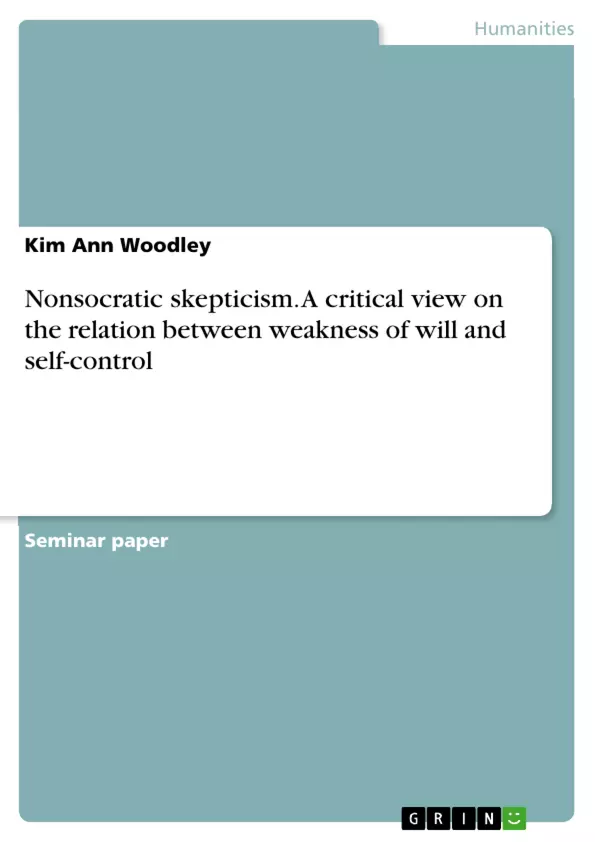This paper will be about reconstructing the argumentation of "Skepticism about Weakness of Will" (1977) by Watson and about discussing if his proposal is plausible. My main thesis is that he cannot give a clear answer to the question of when exactly a person acts weak-willed, either. One point of criticism will be about him introducing the term "self-control" as a solution. We will see that this kind of solution creates new issues. For instance, how do we know if and when a person is or should be capable of self-control? A second point will be about Watson’s argument that we can hold a person responsible for acting weak-willed because he/she should have learned and applied the skills needed for resisting but didn’t. What is troubling here, underlies the same problem than the previous question. Are we really able to tell when this is the case? And what are the consequences if we cannot say for sure when a person acts weak-willed?
In "Skepticism about Weakness of Will" (1977) Watson challenges the common account whose proposal consists of two components: First, it believes a weak-willed action to be intentional and against the person’s better judgment. Second, it claims such actions to be free in the sense that the person could have resisted acting weak-willed. Watson himself comes to the opposite conclusion regarding the second component (a weak agent could not have resisted acting against his/her better judgement in the moment of action) based on his main thesis: "Weakness of will involves the failure to develop certain normal capacities of self-control."
Inhaltsverzeichnis (Table of Contents)
- Introduction.
- Socrates and Davidson on weakness of will........
- Socrates..
- Davidson......
- Watson on weakness of will...........
- Watson's criticism regarding Socrates and Davidson
- The virtue self-control
- The difference between weakness of will and compulsion
- Self-control as an explanation........
- Watson versus the common account...
- The plausibility of Watson's proposal
- Are socratism and Davidson to be rejected?..
- Self-control
- Weakness of will versus compulsion.
- Is self-control the solution?...........
- Does Watson's proposal succeed?.
- Conclusion.....
Zielsetzung und Themenschwerpunkte (Objectives and Key Themes)
This paper aims to reconstruct the argumentation presented by Watson in his 1977 work "Skepticism about Weakness of Will," exploring whether his proposed solution to the problem of weakness of will is plausible. The main objective is to analyze Watson's criticism of both Socratic skepticism and Davidson's view, ultimately questioning the relationship between weakness of will and self-control as proposed by Watson.
- The nature of weakness of will and its relationship to intentional action and better judgment.
- The role of self-control in understanding and overcoming weakness of will.
- The limitations of existing accounts of weakness of will, including Socratic skepticism and Davidson's view.
- The plausibility of Watson's nonsocratic skepticism and its implications for understanding free will and moral responsibility.
- The challenges of defining and identifying weakness of will, as well as the consequences of this difficulty.
Zusammenfassung der Kapitel (Chapter Summaries)
The paper begins by defining the traditional understanding of weakness of will, where an individual acts against their better judgment, choosing an action they believe to be less beneficial over a more desirable one. This apparent contradiction between judgment and action is the central focus of the paper.
The second chapter delves into the positions of Socrates and Davidson. Socrates' Socratic skepticism denies the possibility of weakness of will, arguing that an individual would never act freely and intentionally against their better judgment. Davidson, on the other hand, takes the common account view, asserting the existence of weakness of will and attempting to demonstrate its compatibility with intentional action.
Watson's own perspective, nonsocratic skepticism, is presented in the third chapter. He begins by criticizing both Socrates and Davidson, aligning with Socratic skepticism in finding the common account problematic but disagreeing with the denial of weakness of will itself. He then proceeds to distinguish weakness of will from compulsion, connecting both to the virtue of self-control. Through this process, he develops his thesis and argues for the superiority of his proposal over the common account.
The fourth chapter explores the plausibility of Watson's proposed solution. It examines the shortcomings of Socratism and Davidson's views, the role of self-control in overcoming weakness of will, and the difficulty in definitively distinguishing weakness of will from compulsion. The chapter concludes with a critical assessment of whether self-control truly offers a solution and whether Watson's proposal ultimately succeeds.
Schlüsselwörter (Keywords)
This paper examines the philosophical concept of weakness of will, focusing on the critical analysis of the common account and its alternative proposed by Watson. Key themes include: Socratic skepticism, nonsocratic skepticism, intentional action, better judgment, self-control, compulsion, free will, and moral responsibility.
Frequently Asked Questions
What is Watson's main thesis on weakness of will?
Watson argues that weakness of will involves a failure to develop or exercise normal capacities of self-control, rather than being a purely intentional choice against better judgment.
How does Watson's view differ from Socratic skepticism?
While Socrates denies that anyone can knowingly act against their better judgment, Watson acknowledges the phenomenon but links it to a lack of self-control skills.
What is the difference between weakness of will and compulsion?
The paper explores this boundary, questioning whether a weak-willed person "could have resisted" (but didn't) or if they were truly compelled by an irresistible desire.
Can we hold a weak-willed person responsible?
Watson suggests responsibility exists because the individual should have learned and applied the necessary skills for self-control, though the paper critiques the difficulty of proving when this is the case.
What is Davidson's position on weakness of will?
Donald Davidson argues that weakness of will is possible and compatible with intentional action, a view that Watson partially challenges in his 1977 work.
- Quote paper
- Kim Ann Woodley (Author), 2019, Nonsocratic skepticism. A critical view on the relation between weakness of will and self-control, Munich, GRIN Verlag, https://www.grin.com/document/911121



